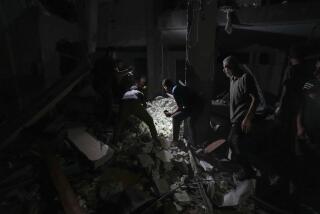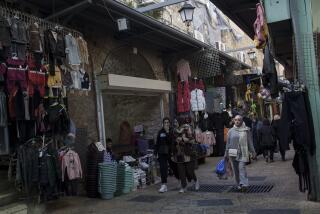Leaders warn against Shiite march
BAGHDAD — Iraqi political leaders warned Thursday that sectarian violence is likely to increase if thousands of Shiite Muslims gather next week at the damaged Golden Mosque in Samarra.
Their warnings came on a day in which at least 38 Iraqis were killed in bombings in the capital.
Iraqi leaders have been pressuring Shiite cleric Muqtada Sadr to abandon plans to lead a procession Thursday to the Golden Mosque, also known as the Askariya Shrine, in the heart of the mostly Sunni Arab city of Samarra, 60 miles north of Baghdad.
The mosque’s two minarets were destroyed in a bombing June 13, about 16 months after the mosque’s signature golden dome was damaged by a massive explosion, touching off months of sectarian clashes nationwide.
Sadr insisted Thursday that the gathering was intended to unify Iraq’s Muslims by celebrating the birthday of the prophet Muhammad’s daughter Fatima Zahra. She is revered by all Muslims but by Shiites especially as the wife of Ali, whom they regard as the first imam.
“Our sole purpose is to reach out and show that at core Sunnis are the same as Shiites and revere the prophet Muhammad’s family, and that there should not be any animosity toward them, only the terrorists and the occupiers,” Sadr said in a statement.
But some Iraqi politicians alleged that Sadr wants to displace Sunni residents and resettle Shiites in Samarra. A government statement released late Thursday discouraged the procession, noting that routes into Samarra have been targeted by insurgents.
Salih Agaili, a Sadr loyalist and member of parliament, said that among national leaders, there was more support than opposition to the gathering. He said some Sunni sheiks planned to participate, but added that he could not say who, because of security concerns. Insurgents have targeted Sunni sheiks in a series of attacks, including a bombing Monday at a Baghdad hotel that killed five leaders who were cooperating with the U.S. against Al Qaeda militants.
“We have conducted numerous meetings with Sunni and Shiite tribes who pledged their participation,” Agaili said.
Sectarian tensions among political leaders increased this week after the Shiite-led government issued an arrest warrant for Culture Minister Asad Kamal Hashimi. The Sunni politician is wanted in connection with an assassination attempt in 2005 against Mithal Alusi, a secular Sunni lawmaker who lost two sons in the attack.
Alusi on Thursday accused U.S. authorities of allowing Hashimi to hide in the Rashid Hotel in the fortified Green Zone. He called on the U.S. envoy, Ryan Crocker, “to be a good ambassador” and stop sheltering Hashimi. “This is a justice system,” Alusi said. “If we don’t start to respect the law, we don’t have any kind of regime which can succeed.”
U.S. Embassy spokesman Philip Reeker said embassy officials were not blocking Hashimi’s arrest or the Iraqi government’s investigation.
“We’re not involved in it nor have we intervened,” he said.
One U.S. soldier was killed Thursday and another wounded in a roadside bombing while patrolling in east Baghdad, the military said.
At least 3,571 American troops have died in Iraq since the March 2003 U.S.-led invasion, according to the icasualties.org website.
Thursday’s deadliest attack came about 8:15 a.m. when a bomb planted in a pickup truck exploded at a crowded bus station in Bayaa, in southwest Baghdad.
The blast killed 25 people and injured 50 in the mostly Shiite neighborhood, where sectarian violence has increased recently.
Ahmad Kamil, 46, a government worker, was about to board a bus to work when the bomb exploded, sending shrapnel into his forehead, stomach and left arm.
“I felt the huge blast and I was pushed away violently,” he said. “I didn’t realize what had happened at that moment. I almost fainted.”
Kamil and others injured in the blast were taken to Yarmouk Hospital. Staff members converted two treatment rooms into emergency areas to treat the wounded, who included many women and children, police said.
But Kamil said the hospital was overwhelmed.
“I am lucky,” he said. “Other injured people here are terribly burned and injured. They might not survive.”
Elsewhere in the capital, mortar attacks killed two people in the Shorja market, four in Fadhil, two in Amin, one in Rashad and another in Zafaraniya. A mortar round also damaged a water-treatment plant near the Green Zone.
In west Baghdad’s Mansour neighborhood, four people died and 10 were injured when a car bomb exploded near a gasoline station. And gunmen opened fire in the Amil neighborhood of southwest Baghdad, killing one person and injuring another.
Police also recovered 15 unidentified bodies in Baghdad.
Early Thursday, three British soldiers were killed and one injured when a bomb exploded as they were walking near their vehicle southeast of the southern city of Basra, said British spokesman Maj. Matthew Bird.
At least 156 British troops have been killed in Iraq since the war began, according to icasualties.org.
Witnesses reported Thursday that British forces opened fire from a helicopter, killing five people in a vehicle west of Basra.
British spokesman Maj. David Gell said the civilians were killed by fire from the helicopter and by a roadside bombing.
--
molly.hennessy-fiske@latimes.com
Times staff writers Ned Parker, Saif Hameed, Said Rifai, Suhail Ahmad and Raheem Salman and special correspondents in Baghdad and Hillah contributed to this report.
More to Read
Sign up for Essential California
The most important California stories and recommendations in your inbox every morning.
You may occasionally receive promotional content from the Los Angeles Times.











